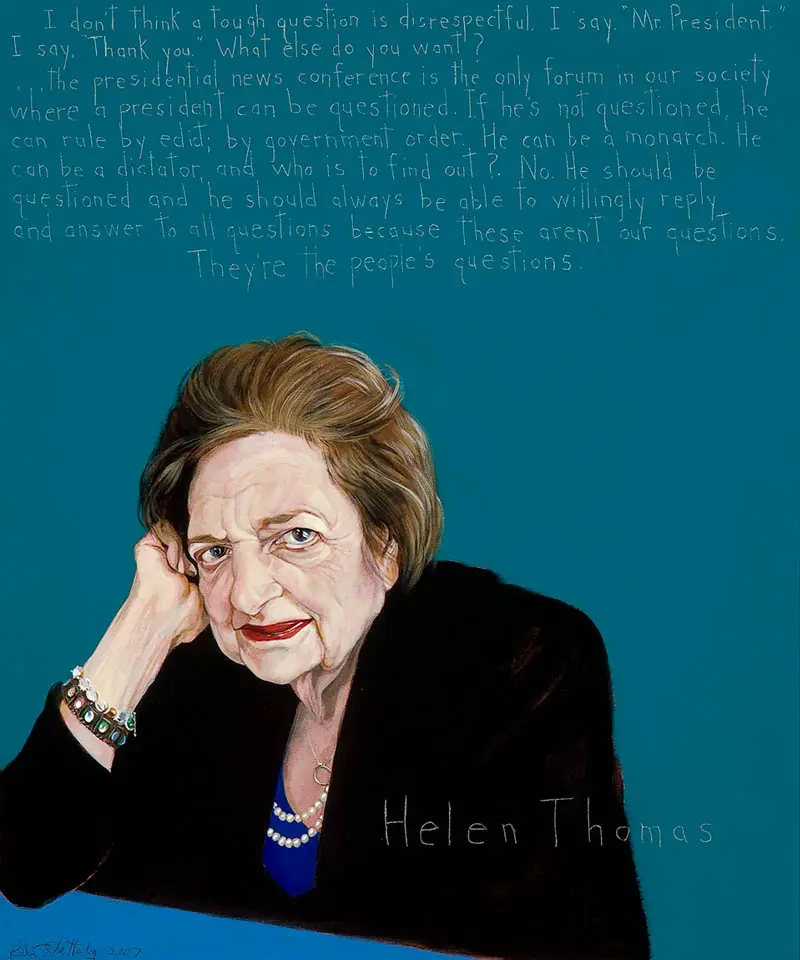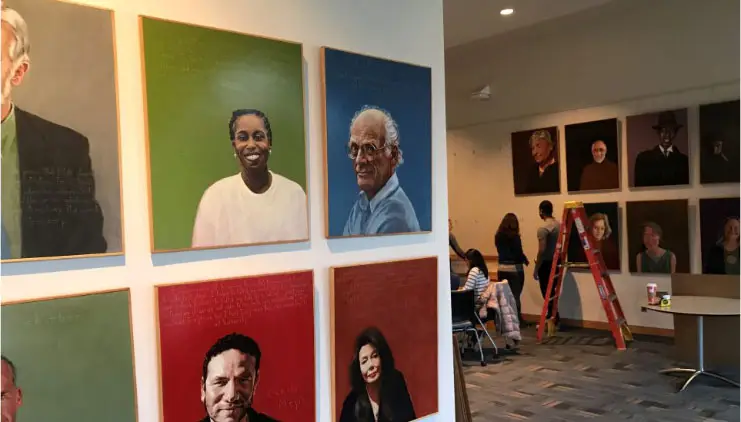
Helen Thomas
Helen Thomas
White House Press Corps Reporter : 1920 - 2013
“I don’t think a tough question is disrespectful. I say. ´Mr. President…´ I say, ´Thank you.´ What else do you want? The presidential news conference is the only forum in our society where a president can be questioned. If he’s not questioned, he can rule by edict; by government order. He can be a monarch. He can be a dictator, and who is to find out? No. He should be questioned and he should always be able to willingly reply and answer to all questions because these aren’t our questions. They’re the people’s questions.”
Biography
To say Helen Thomas is a reporter doesn´t do her justice. In her early career, Thomas toppled barriers for female journalists, opening the door for others. She has earned a well-deserved spot as a fearless leader of the press, always urging herself and others to put the tough questions to our political figures.
Helen Thomas, whose parents were Lebanese immigrants, was born in Winchester, KY, and raised in Detroit, MI. Upon graduation from college, Thomas moved to Washington, D.C. to make her mark as a journalist. Her first job was as a copygirl/gopher at The Washington Daily News. She was promoted to cub reporter, but was then laid off due to cutbacks. In 1943, Thomas joined United Press International (UPI), and covered women’s interest stories for their radio wire service. Undaunted, Thomas, whose interest was in politics and hard news, persevered and by 1955 was assigned to cover the US Department of Justice.
In 1960, with the election of President Kennedy, Thomas began her breakout job of attending the daily White House press briefings and presidential press conferences. Thomas became known as the “Sitting Buddha”; she sat in the front row, always asked the first question, and closed presidential conferences with her signature, “Thank you, Mr. President.” Her determination to do her job well helped her break down gender barriers in her profession.
Thomas was president of the Women’s National Press Club in 1959, when Soviet leader, Nikita Khrushchev was invited to the US. The tradition was that foreign visitors would attend a luncheon at the National Press Club – where women weren’t allowed. Thomas and other women reporters made such strong objections that they were finally invited to the luncheon. Thomas would later be the first female officer of the National Press Club. In 1970, the UPI named her chief White House correspondent and later, chief of the UPI’s White House bureau, the first woman to hold that position.
When President Nixon made a historic trip to China in 1972, Helen Thomas was one of the reporters hand-picked for the trip, and the only woman print journalist allowed by China to accompany him. In 2000 after 57 years of service, she resigned from UPI to become a columnist for Hearst Newspapers.
Thomas´ relentless pursuit of the truth has not always made her popular among the presidents she’s covered. During the George W. Bush administration, Thomas was moved from the front row to the back during presidential press conferences. Thomas claims that one of the reasons for the move was her many pointed questions.
“All presidents,” she says, “think that most information involving government and the White House belongs to them, to their domain, and I think it belongs in the public. I don’t think they should have these secrets – I think it’s unconscionable the hold they have.”
She gives her opinions freely now because she is a columnist, saying “I can say all of this because I’m a columnist now….I permitted myself to think, to care, to believe – but I didn’t permit myself the luxury of having it in my copy.”
Thomas has been critical of her colleagues. After the attacks on 9/11 and the push for war, Thomas believes that reporters were afraid to ask tough questions, afraid to appear unpatriotic. She writes that it’s imperative for reporters to continue pushing for the truth, letting “the chips fall where they may.”
Helen Thomas has written several books, the latest called Watchdogs of the Press?: The Waning Washington Press Corps and How It Has Failed the Public. She is the subject of a documentary titled Thank You, Mr. President: Helen Thomas at the White House, and recently wrote a children’s book, The Great White House Escape. She says she is as enthusiastic about her job today as she was the day when she saw her first byline on a story in high school.
Programs
Americans Who Tell the Truth (AWTT) offers a variety of ways to engage with its portraits and portrait subjects. Host an exhibit, use our free lesson plans and educational programs, or engage with a member of the AWTT team or portrait subjects.

Education
AWTT has educational materials and lesson plans that ask students to grapple with truth, justice, and freedom.

Exhibits & Community Engagement
AWTT encourages community engagement programs and exhibits accompanied by public events that stimulate dialogue around citizenship, education, and activism.